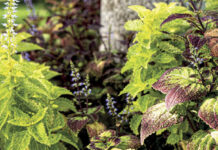Green gardening practices can be easy to adopt and provide peace of mind that your efforts to harness Mother Nature are not inadvertently harmful.
Elements of green gardening include composting, gardening with native plants, eliminating invasive exotics, and creating wildlife habitats. These often work in tandem.
The Organic Landscape Alliance says that native species are invasive, drought tolerant and adapted to local growing conditions. Generally they require less attention and labour, are pest resistant, encourage indigenous wildlife and increase bio-diversity. Planting native species preserves genetic diversity and a region’s natural history.
Places to start acquiring such plants locally are the Native Tree nursery at the Queen Elizabeth II Botanic Park; Sticks and Stones, which carries many of the park’s indigenous plants and the Department of Agriculture on Agricola Way in Savannah. The Botanic Park’s nursery has the Cayman Collection: 30 species of native trees and shrubs.
Other green gardening steps include reducing the use of polluting equipment like lawn mowers and leaf blowers and reducing the use of chemical pesticides and fertilisers.
This last point merits attention, as gardening has become such a well established industry that it is easier than ever to reach for the bug spray, fertiliser and weed killer without thinking about what their impact may be further down the road.
Some enlightened countries have banned certain lawn and garden chemicals and only allow others in critical cases.
The province of Ontario in Canada, for example, has banned all cosmetic lawn chemicals, leaving homeowners and landscaping companies to deal with weeds and pests in more eco-friendly ways.
In Cayman, local garden centres like Green Thumb Home and Garend Center carry cow manure, a perfect alternative to chemical fertilisers.
Avoiding some chemicals
The reasons to eliminate chemicals go past what is good for your garden. The human body can react adversely to prolonged contact with some pesticides and chemicals.
In fact some have been found by studies to mutate or kill human cells leading to an increased likelihood of abnormal foetal development, low birth weights and the increased onset of certain cancers.
Pest management
The US Environmental Protection Agency advocates what is known as integrated pest management. It starts with prevention:
• Maintain healthy soil with compost and mulch.
• Select pest-resistant plants and put them in the sun/shade and soil conditions they like.
• Use a variety of plants so, if pests attack, your whole garden is not at risk.
• Clean out diseased plants so disease doesn’t spread.
• Pull weeds before they go to seed and spread.
• Remove dead plants to reduce hiding places for insect pests.
The EPA also advises that: “The cause of ailing plants or grass may not be pests or disease but incorrect mowing or pruning, improper watering or other easily corrected practices. That scary bug could actually be a beneficial good bug that eats problem pests.” Be prepared to accept a little damage–give nature time to work.
“Natural predators often bring pests under control, but they need time to work. Monitor your landscape to spot signs of pests but do not spray at the first sign of damage–nature may control it for you or plants may outgrow the damage,” it advises.
In advocating the responsible use of pesticides the EPA recommends:
-
If a pest or weed problem develops, use physical controls like traps, barriers, fabric row covers or plants that repel pests.
-
Using a little elbow grease – pull weeds by hand, use mulch to prevent weed growth in flower beds, and rotate annuals to minimise their susceptibility to pests and disease.
-
Replacing problem plants with pest-resistant ones.
Chemical free gardens
Complete removal of weeds and pests is not possible or necessary. Get to know your pests, and if their predators are abundant they won’t be pests for too long.
Companion planting, or the planting of teams of complimentary plants, is an organic way to deter pests, where no pesticides or herbicides are used
Garlic and roses planted together discourage aphid and Japanese beetle, while marigolds discourage certain undesirable nematodes.
Encourage useful bugs. Here in Cayman, the introduction of parasitic wasps is a green-inspired measure to control the pink Hibiscus mealy bug without chemicals.
The Organic Landscape Alliance suggests gardeners:
-
Trying organic sprays such as garlic oil, a high pressured water sprayer or bug traps to naturally keep pests at bay; and
-
Killing weeds on the spot by either digging them up or pouring boiling water over them.






























